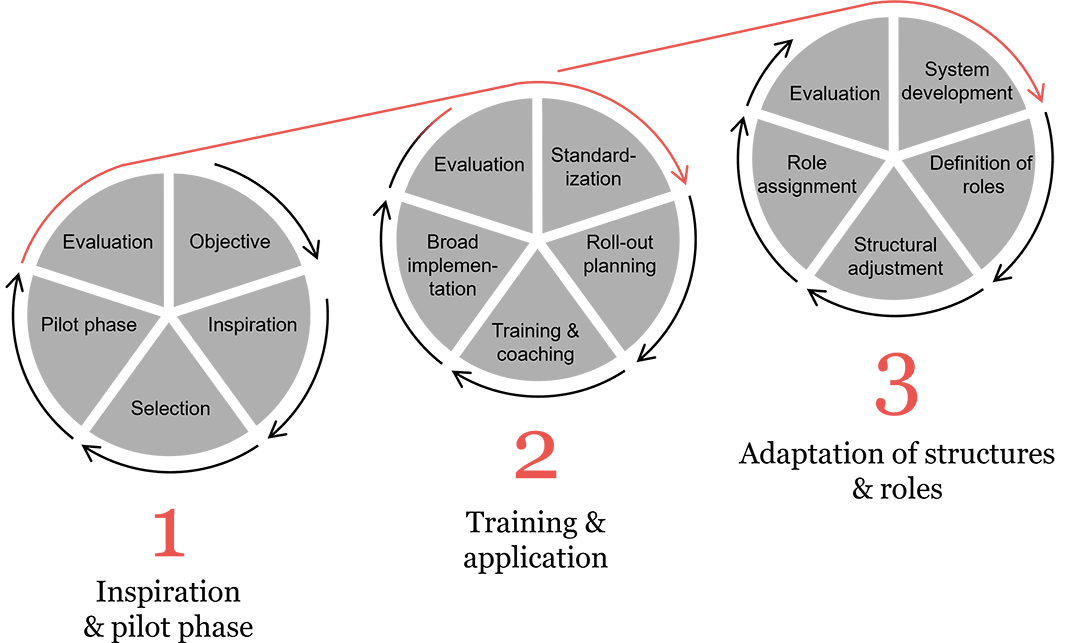Integration of Agile Methods: OKR and SCRUM Methods
- How can we successfully integrate agile approaches into our organisation and where do elements of self-organisation really make sense?
- How must the introduction of OKRs be designed in order to motivate employees for real objectives and generate better output?
- How can we utilise SCRUM methods in our organisation in a pragmatic way?
By their very nature, agile transformation processes are complex. That's why we don't offer “off-the-shelf” solutions, but solutions tailored to your current situation and dynamics. For agile development to succeed and bring the desired and necessary added value, it is essential that agile principles are understood and put into practice at all management levels. We can support you on your journey to find the right agile frameworks and methods and to successfully implement them, step by step.
Organisational development with the goal of successfully implementing agile working methods and principles is achieved through a step-by-step approach with learning loops:

Phase 1: Inspiration & pilot phase
In this initial phase, the focus is on identifying needs, setting goals and testing initial solutions on a small scale. The individual steps include:
- Objective: The first step is to define clear, measurable objectives relevant to the current situation.
- Inspiration: Innovative ideas and approaches are collected that can serve as a basis for further development.
- Selection: Suitable methods and tools are selected that meet the defined objectives and requirements.
- Pilot phase: The selected approaches are tested in a pilot project to gain initial insights and experience.
- Evaluation: Lastly, the results of the pilot phase are evaluated to identify strengths and weaknesses. Necessary adaptations and changes are made.
Phase 2: Training & application
The second phase involves scaling and standardizing the knowledge gained in the pilot phase as well as providing comprehensive training and support for those involved:
- Standardization: Successful approaches are standardized and defined as best practices.
- Roll-out planning: A detailed plan is drawn up for the gradual introduction of the standardized methods.
- Training & coaching: To ensure acceptance and application, comprehensive training and coaching sessions are held for all those involved.
- Broad implementation: The standardized approaches are rolled out and implemented across the entire organization.
- Evaluation: The implementation results are continously assessed.
Phase 3: Adaptation of structures and roles
The final phase focuses on the long-term anchoring of the new approaches and the adaptation of organizational structures and roles:
- System development: Necessary adjustments and further developments are made to the systems in order to support the new approaches.
- Role assignment: New or adapted roles are defined and filled to support the new structures.
- Definition of roles: Clear definition and delimitation of the new roles and responsibilities.
- Structural adjustment: The organizational structures are adjusted to optimally support the new processes and roles.
- Evaluation: There is an ongoing assessment of the structural adjustment measures and their efficacy.
We work together with you to develop the right steps on the journey to greater agility. This way, your company remains flexible and can react promptly and proactively to challenges and rapid change.
OKR - Objectives & Key Results
Today, organisations face the challenge of successfully implementing their strategic goals in a complex environment. With the help of OKR, organisations can successfully implement their strategies in an agile, iterative manner by defining strategically relevant goals (objectives) on a rolling quarterly basis and assigning measurable concrete results per objective (key results).
5P supports the creation as well as the evaluation and optimisation of OKR processes, facilitates OKR meetings and workshops, trains and coaches managers and teams, and advises and supports management and HR in the creation of favorable framework conditions.
SCRUM
The SCRUM framework offers proven methods for systematic agile work. Many are also helpful for other formats, in “classically” organised collaboration for managers and internal facilitators. They provide assistance in work organisation, idea generation, formation of opinions, decision-making, mutual consultation, future-oriented reflection, and dealing with tensions.
5P supports, trains and coaches scrum masters, product owners and scrum teams and trains managers and facilitators in the use of SCRUM elements in their work.
